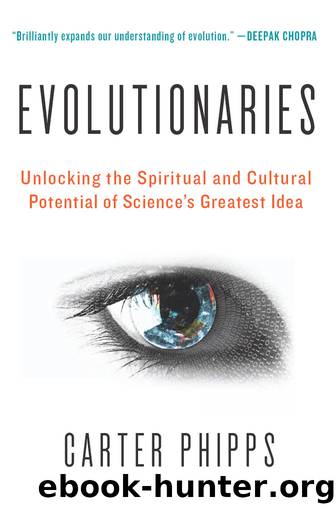Evolutionaries: Unlocking the Spiritual and Cultural Potential of Science's Greatest Idea by Carter Phipps

Author:Carter Phipps [Phipps, Carter]
Language: eng
Format: epub
Tags: Science, Evolution, Life Sciences, Religion, Religion & Science
ISBN: 9780061916137
Publisher: HarperCollins
Published: 2012-06-26T00:00:00+00:00
CHAPTER TEN
Spiral Dynamics: The Invisible Scaffolding of Culture
A developing brain is a sort of snowballing cognitive leviathan that adapts to everything and anything close to it. Learning is one aspect of extreme plasticity, and creativity another. Any species that can do such things as play with the world, imagine it, remember it, and expand its circles of experience . . . will ultimately start to experiment with its own fate.
—Merlin Donald, A Mind So Rare
In my travels around the progressive spiritual and philosophical world over the last two decades, I have met many unique, contradictory, endearing, and surprising characters, but none quite prepared me for my meeting with Don Beck—a tough-talking Texan academic activist with a unique perspective on cultural evolution. With his soft drawl and his mixture of brashness and charm, Beck helped deepen my appreciation of that powerful insight we have explored in the last chapter: that consciousness and culture evolve through identifiable stages and structures. It’s a bold and controversial proposition, but it’s one that is definitely worth the time and investment to understand. And in Beck’s hands, this insight takes on a particular cultural relevance. Whereas much of Jean Gebser’s work was concerned with envisioning forms of consciousness as they first emerged in our cultural past, Beck is concerned with those stages as they continue to manifest today. As I’ve mentioned, the sequence of worldviews that define the trajectory of culture’s unfolding are not simply features of our history—they still exist as stable organizing systems for societies around the world. Understanding the reality and nature of these worldviews is one of those ideas, as they say, whose time has come, and I suspect it will play a critical role in making sure that human beings do not repeat the mistakes of the nineteenth and twentieth centuries in the twenty-first and twenty-second.
While Beck’s system incorporates some of the basic ideas of Gebser, Hegel, and developmental psychology, Spiral Dynamics, as it is known, is a more practical and pragmatic way to look at the evolution of worldviews. It is the brainchild of maverick psychologist Clare Graves, who was Beck’s friend and mentor before his death in 1986. The basic idea of Spiral Dynamics is quite simple—deceptively so. There are eight stages or “value systems” or worldviews (Beck currently refers to them as “codes”) that form the basic structures of human psychology and sociology. These stages make up an ascending evolutionary spiral that both individuals and cultures will pass through as they develop—psychologically, socially, morally, spiritually. Beck refers to these as “bio-psycho-social-spiritual” systems that form a sort of invisible scaffolding in our consciousness, unseen but influential cognitive structures that condition our perspectives and our values analogous to the way DNA influences but does not exactly determine the forms and features of an organism. Indeed, just as Abraham Maslow, the mid-twentieth-century pioneering psychologist, was tracking a hierarchy of needs, Spiral Dynamics tracks a hierarchy of values. In fact, the relationship between those two developmental systems goes beyond mere systemic resemblance; Maslow and Graves themselves were friends and colleagues.
Download
This site does not store any files on its server. We only index and link to content provided by other sites. Please contact the content providers to delete copyright contents if any and email us, we'll remove relevant links or contents immediately.
The Lost Art of Listening by Michael P. Nichols(7459)
Why I Am Not A Calvinist by Dr. Peter S. Ruckman(4125)
The Rosicrucians by Christopher McIntosh(3493)
Wicca: a guide for the solitary practitioner by Scott Cunningham(3151)
Signature in the Cell: DNA and the Evidence for Intelligent Design by Stephen C. Meyer(3105)
Real Sex by Lauren F. Winner(2990)
The Holy Spirit by Billy Graham(2919)
To Light a Sacred Flame by Silver RavenWolf(2792)
The End of Faith by Sam Harris(2711)
The Gnostic Gospels by Pagels Elaine(2503)
Waking Up by Sam Harris(2431)
Nine Parts of Desire by Geraldine Brooks(2348)
Jesus by Paul Johnson(2333)
Devil, The by Almond Philip C(2306)
The God delusion by Richard Dawkins(2285)
Heavens on Earth by Michael Shermer(2263)
Kundalini by Gopi Krishna(2154)
Chosen by God by R. C. Sproul(2145)
The Nature of Consciousness by Rupert Spira(2072)
